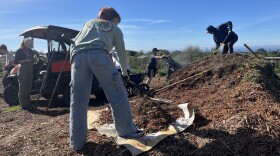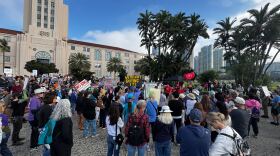Michael Kenny's oldest child was in kindergarten when he and other parents began planning to convert their public school's gravel playground to grass. Today, his daughter is in the eighth grade.
Money was just one of the reasons the project was delayed for years, but in 2008 all that changed. The Language Academy got nearly $1 million in a federal grant to replace the gravel with artificial turf.
"Like a bolt of lightening we got the whole thing fully funded," said Kenny, a parent with three children in the elementary and middle school.
The money came from the Community Development Block Grant (CDBG) program. The U.S. Department of Housing and Urban Development (HUD) gives cities across the country CDBG funds to improve poor and moderate income neighborhoods. Last year the city of San Diego received $16 million.
Two federal investigations in 2007 and 2008 found the city didn't properly keep track of how it was spending CDBG funds.
Since that time, the city has been making efforts to reform the grant program, but the clean-up is proving to be a long and complicated process with some collateral damage along the way, including The Language Academy's playground. It nearly lost it's grant last week when the city began purging old CDBG grants from the books.
New staff has been hired to implement the reforms, including Beth Murray, economic development deputy director in the city's Planning and Community Investment Department. Murray said when she began her new position in 2008, she had no idea how big a mess her department needed to address.
“I mean we knew that it was a mess," said Murray, "and we knew that we not only had to deal with the policy part of it but the accounting part of it because we didn’t have any idea that there were over 800 projects on the books and we dove in and we were discovering things every day."
Some of the 800 projects dated back to 1992, many of them never completed or even started.
The city also has to repay millions of dollars in loans it made from CDBG funds to city redevelopment agencies.
According to a 2008 federal audit, $149 million in CDBG money was loaned without a repayment plan.
CDBG Program Administrator Angela Nazareno, also hired in 2008, said the city didn't follow the all the rules when it made those loans.
“You are able to do that, you can issue loans, but it would have taken another process and another step to do it correctly,” Nazareno said.
In a settlement with the federal government, the redevelopment agencies agreed to payback about half the money, $78 million, without interest, over the next 10 years.
Also among the violations, the city has too much money in its federal reserve account. In other words, it’s not spending the grant money fast enough.
Murray said city council members were giving several grants to many organizations. Those groups often spent years re-applying for grant money until they had enough to complete their projects.
“Spreading money too thinly results in not completing projects,” Murray said.
The rules have now changed. City council has since agreed to fully fund projects or not fund them at all, Murray said.
Last week in an effort to clean house and lower its federal reserve balance, the city purged 400 previously-funded community development projects that had been on the books for years. In one fell swoop, the city rid itself of nearly $12 million in projects.
The Language Academy playground was on the list of projects to be canceled. An effort by parents and Councilmember Marti Emerald re-instated the grant to the school.
Parent Michael Kenny said he's happy to have the money back. But he's keeping his fingers crossed the permitting and planning process for the playground jumps all the bureaucratic hurdles in time to meet the new CDGB rules: all new projects must be completed in 18 months or risk losing funding.






